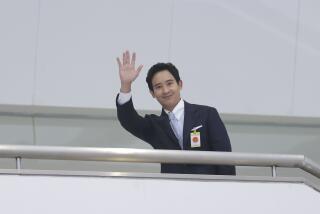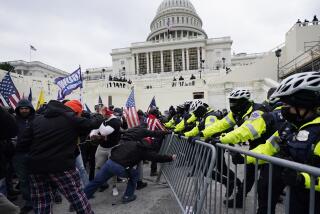Yeltsin Upheld on Communist Leadership Ban
- Share via
MOSCOW — In a landmark verdict on the once all-powerful Soviet Communist Party, Russia’s Constitutional Court on Monday supported President Boris N. Yeltsin’s decree abolishing the party’s hierarchy--from its top leadership to its district chapters.
But the court ruled that it was illegal to ban the party’s neighborhood groups.
Both sides claimed at least partial victory.
“(The court) has made a historic and legal decision on the most complex and pressing problem in the history of Russia,” Gennady E. Burbulis, a top Yeltsin adviser, told a news conference. “I think the court’s decision will strengthen reforms and weaken any basis for revenge (by Communists).”
But some Communists claimed that the verdict marked the beginning of a resurgence of the Communist Party, which monopolized power in the country for 73 years.
The court’s decision comes on the eve of the opening of the Congress of People’s Deputies, the nation’s supreme legislative body, which is expected to decide whether to extend Yeltsin’s extraordinary powers to rule by decree. Had the court ruled his decree banning the Communist Party unconstitutional, the bid by Yeltsin’s already formidable conservative opposition to diminish his powers and slow reforms would surely have been strengthened.
The trial was also seen as a test of the fledgling Constitutional Court, established only last year, and its ability to stand up to a mighty Russian president and powerful legislature, even though Russia has no history of a truly independent judiciary.
“The Constitutional Court’s ruling is not a victory for the president, but rather a victory for the whole society, which for the first time is resolving such questions by civilized means,” said Mikhail Fedotov, a lawyer for the president’s side.
Yeltsin dissolved the Communist Party and seized its property after hard-line forces tried to overthrow his democratically elected government in August, 1991. Citing the ban as proof of Yeltsin’s attempt to create a dictatorship disguised as democracy, 37 pro-Communist legislators appealed to the Russian Constitutional Court, which agreed to consider the constitutionality of the decree.
During the six-month case, the defense tried to prove that the Communist Party was never just a political party but a totalitarian state structure that had controlled the legislative, judicial and executive branches and, therefore, had to be abolished.
The court straddled both positions. It agreed with the Communists that Yeltsin had no right to abolish the Communist political groups that gather of their own free will in their neighborhoods; it also sided, however, with the democrats who said that banning the party’s vast hierarchy was necessary because it functioned as an unconstitutional government structure.
The president’s lawyers filed a countersuit charging that the Communist Party took power illegally in the 1917 Bolshevik Revolution, persecuted and murdered millions of people and clung to power until it was abolished by Yeltsin. The court ruled that the countersuit did not require a verdict, because “in August, 1991, the Communist Party of the Soviet Union in fact collapsed and lost the status of an all-union organization and its organizational structure was dissolved.”
In announcing the verdicts of the 13-judge court, Chief Justice Valery Zorkin said the court would not rule on the Communist Party constitutionality because the party no longer exists and so does not threaten the constitution.
But the court ruled that Yeltsin was within his rights when he seized state property that was under Communist Party control at the time of the coup. The court of arbitration, Russia’s business court, will have jurisdiction to rule in disputes over ownership of property formerly controlled by the Soviet Communist Party, Zorkin said.
Andrei Makarov, a lawyer on the president’s side, said the court had upheld the ban on all but the most benign structures of the Communist Party--neighborhood party cells, made up of residents of several apartment buildings and attended primarily by retired people.
“It is true you cannot consider these pensioners as part of the state structure--I can agree with this,” Makarov said.
Meantime, representatives of the Communist Party said they were vindicated because the court chose not to rule on the constitutionality of the party itself, declared Yeltsin wrong in abolishing grass-roots groups and opened the possibility of reclaiming some party property.
During the stormy trial, the Constitutional Court became a hot spot of political activity. It was a venue for revelations about party crimes, a battleground for competing political forces and a boxing ring for the latest round of blows between Yeltsin and former Soviet President Mikhail S. Gorbachev.
Both Communist and Yeltsin-style reformers used the court to try to increase their political base and discredit their opponents.
And the court temporarily barred Gorbachev from leaving the country because he refused to testify for what he called a “political game.”
Representatives of both sides in the trial also said that the coming months will be the real test of the Communists’ support in Russian society today.
“We have been told that the group sitting to the right in the hall represented millions of Communists,” Makarov said. “If we don’t see (millions of people protesting the decision), it will again show that this little group of people represents nobody.”
He stressed that those faithful to the former Communist Party would have to compete for members with the eight or so other Communist political groups that have formed over the last year.
But representatives of the Communists said their time will come again.
“The Communist Party will be restored,” said Anatoly Denisov, who represented the Communists during the trial. “We who worked for the Communist Party in the trial have come to believe that this shaky period has been healthy for the party because through it the party has been purified and renewed.”
Andrei Ostroukh, a reporter in the Moscow bureau, contributed to this report.
More to Read
Sign up for Essential California
The most important California stories and recommendations in your inbox every morning.
You may occasionally receive promotional content from the Los Angeles Times.










